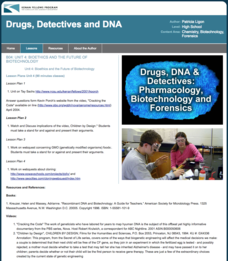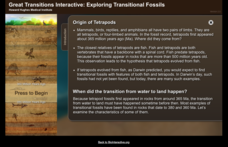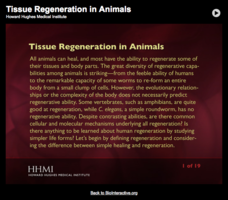California Department of Education
Learn to Reach Out
How can social media help my career? Explore the world of networking through a lesson about professional organizations. The fourth of six career and college readiness lessons has seniors research organizations in their professions of...
Kenan Fellows
Unit 4: Bioethics and the Future of Biotechnology
What's the future of biotechnology? Explore a hot topic in the fourth and final unit in a series of Biotechnology lessons. Learners develop an understanding of the many issues in bioethics, then create an argument for or against the role...
Howard Hughes Medical Institute
Creating Phylogenetic Trees from DNA Sequences
How closely are animals related? Check their phylogenetic trees! The use of DNA sequencing altered our understanding of these relationships. Individuals explore and gain a better understanding of how scientists sort, align, and determine...
Howard Hughes Medical Institute
Skeletons Reveal Human and Chimpanzee Evolution
Ardipithecus ramidus shares features with both humans and chimpanzees. Learn about where Ardi, humans, and chimps fit in the tree of life by comparing anatomical features including the foot, pelvis, and teeth. After exploring those...
Howard Hughes Medical Institute
Regulation of the Lactase Gene
All human infants are lactose tolerant, yet some adults are lactose intolerant—why is that? Individuals discover the process of gene mutation through a study of the lactase gene (LCT). They understand the geographic connections,...
Howard Hughes Medical Institute
Paleoclimate: A History of Change
Earth's climate changed drastically throughout the history of the planet, so why do scientists blame humans for recent changes? Observe data covering the history of the planet that proves the natural climate change patterns. Then, learn...
Howard Hughes Medical Institute
Geological History of Oxygen
Earth didn't always have oxygen, so what caused the change that allows humans to live here? Learn about the change in O2 levels throughout geological history through an interactive graph. Each section offers greater detail on the changes...
Howard Hughes Medical Institute
Explore Your Inner Animals
Human bodies prove evolution thanks to our genes, bones, and more. Learning about specific body parts and how they evolved from other species helps individuals better understand the transition species that helped us become who we are today.
Howard Hughes Medical Institute
Great Transitions Interactive
How did life evolve from fish to four-limbed animals? Work through an interactive exploring transition animals and comparing their features to understand the transition. Making it even better, the interactive allows scholars to isolate...
Howard Hughes Medical Institute
DNA Sequence Assembly
Oncologists use DNA sequence data to identify specific cancers and offer more targeted treatments. Grasp an understanding of the complexity involved by learning how the body sequences and assembles DNA. Eager scientists explore the...
Howard Hughes Medical Institute
Stopping Mosquito-Borne Disease
Fifty million people catch dengue fever each year. Understanding the transmission and symptoms of this disease helps people prevent and treat it. Learn about multiple intervention strategies and view graphs of their effects to stop the...
Howard Hughes Medical Institute
Bacterial Quorum Sensing
The marine bacteria vibrio harveyi helps with DNA repair in humans. Understanding how to manipulate and genetically mutate this bacteria fascinates researchers. Young scientists observe two different mutations, predict the resulting...
Howard Hughes Medical Institute
Neural Control of Walking and Running
Physical therapists state that relearning how to walk often motivates stroke and brain injury patients. Researchers spend a great deal of time focused on understanding the neural control required for walking. They pass along that...
Howard Hughes Medical Institute
Retroviruses and Viral Diversity
Eight percent of DNA comes from retroviruses. Learn what sets retroviruses apart from other types of viruses with an presentation that focuses on the differences between viruses with a DNA genome, an RNA genome, and retroviruses.
Howard Hughes Medical Institute
Stem-Cell-Based Therapies
Currently, stem cell therapies treat more than 80 diseases, and that number grows every year. Individuals learn about some of these therapies and where the stem cells come from. They then focus on the future of stem cell treatments and...
Howard Hughes Medical Institute
Tissue Regeneration in Animals
Every species regenerates at least one tissue or organ in their bodies. Learn about different regeneration processes in animals. An intriguing presentation specifically discusses starfish, hydras, planaria, salamanders, mice, humans,...
Howard Hughes Medical Institute
Genetic Switches
Is it reasonable for us to alter genes in plants to make them more nutritious and better tasting? Is it reasonable for us to alter genes to make babies smarter or better looking? The human genome contains millions of gene switches for...
Howard Hughes Medical Institute
Natural and Artificial Selection
Many people oppose genetically modified foods yet support selective breeding in dogs. Learn about the similarities and differences through a short presentation that features many video clips. It covers natural selection, artificial...
Howard Hughes Medical Institute
How the Body Uses Fat
Not all fat is bad—eating good fats actually helps with weight loss. Learn how the body uses fat through a 27-slide presentation that breaks down the path fat takes from entering to exiting the body. Understanding why fat is helpful and...
Kenan Fellows
Unit 1: Introduction to Biotechnology
Biotechnology is big! Introduce the uses of biotechnology to science scholars with a fascinating, fact-filled unit. The first installment in a series of four biotechnology units covers the role biotechnology plays in human and...
Social Media Toolbox
Social Media Usage
Is there a difference in the way organizations present news via social media and in print? The third in a series of 16 lessons from The Social Media Toolbox explores news outlets and their delivery methods. Groups follow a story for a...
Social Media Toolbox
Why Social Media?
Is social media the best way to convey news in your school? Young journalists dig deep into the social media question in the second of 16 lessons from The Social Media Toolbox. After learning about the relationship between social media...
Social Media Toolbox
Ethical Decision Making
When faced with a dilemma, how do journalists decide how much news to use? Social media scholars explore the philosophies of ethical resolution in the first of a 16-part Social Media Toolbox series. Partnered pupils use a Potter Box to...
California Department of Education
Etiquette? What’s That?
Business etiquette is a big deal! Are your scholars prepared to impress in the business world? The third in a series of six college and career readiness lessons focuses on basic behaviors in business situations. Groups research specific...

























